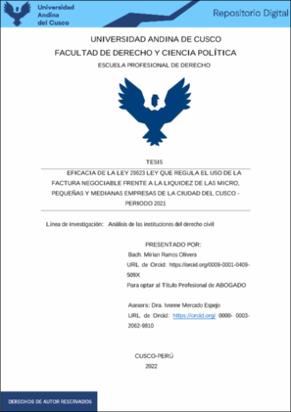| dc.contributor.advisor | Mercado Espejo, Ivonne | |
| dc.contributor.author | Ramos Olivera, Mirian | |
| dc.date.accessioned | 2023-09-20T20:41:12Z | |
| dc.date.available | 2023-09-20T20:41:12Z | |
| dc.date.issued | 2022-12-16 | |
| dc.identifier.uri | https://hdl.handle.net/20.500.12557/5710 | |
| dc.description.abstract | La presente investigación analiza la eficacia de la ley 29623, específicamente el uso de la
factura negociable frente a la liquidez de las micro, pequeñas y medianas empresas. Como
objetivo general, el estudio plantea Determinar de qué manera la incorporación de la
factura negociable ley 29623 influye en el financiamiento de las micros, pequeñas y
medianas empresas (MIPYMES) de la ciudad del Cusco - Periodo 2021.
La metodología que se utilizo fue de enfoque cualitativo, tipo no experimental, nivel
explicativo. La población de estudio estuvo constituida por empresas del nivel micro,
pequeñas y medianas de la ciudad del Cusco en el periodo 2021. Para la recolección de
datos se utilizaron las técnicas de análisis documental, observación y entrevista. Los
instrumentos fueron: ficha de análisis documental, ficha de observación y guía de
entrevistas.
Los resultados establecen que, las micro y pequeñas empresas, no lograron
autofinanciarse con las Facturas Negociables por la incertidumbre en el plazo de
ejecución de la factura negociable en efectivo estando considerado por las instituciones
financieras como el riesgo alto. Se concluyo que, la incorporación de la factura negociable
como instrumento de financiamiento a través de la ley Nº 29623 “Ley que Promueve el
Financiamiento a Través de la Factura Comercial” tiene como la finalidad mejorar el
financiamiento de las micro y pequeñas empresas (MYPES); sin embargo, no constituye
financiamiento, debido a que los clientes de las micro y pequeñas empresas no garantizan
el cobro efectivo de la factura negociable; por tal motivo, las entidades financieras
desconfían del cumplimiento del plazo del vencimiento. | es_PE |
| dc.description.abstract | The present investigation analyzes the effectiveness of Law 29623, specifically the use
of the negotiable invoice against the liquidity of micro, small and medium-sized
companies. As a general objective, the study proposes to determine how the incorporation
of the negotiable invoice law 29623 influences the financing of micro, small and medium-
sized enterprises (MIPYMES) in the city of Cusco - Period 2021.
The methodology used was a qualitative approach, non-experimental type, explanatory
level. The study population consisted of companies at the micro, small and medium level
of the city of Cusco in the period 2021. For data collection, documentary analysis,
observation and interview techniques were used. The instruments were: documentary
analysis sheet, observation sheet and interview guide.
The results establish that the micro and small companies were not able to self-finance
with the Negotiable Invoices due to the uncertainty in the term of execution of the
negotiable invoice in cash, being considered by financial institutions as high risk. It was
concluded that the incorporation of the negotiable invoice as a financing instrument
through Law No. 29623 "Law that Promotes Financing Through Commercial Invoice"
has the purpose of improving the financing of micro and small enterprises (MYPES). ;
however, it does not constitute financing, since the clients of the micro and small
companies do not guarantee the effective collection of the negotiable invoice; For this
reason, financial institutions are wary of compliance with the maturity period. | en_US |
| dc.format | application/pdf | es_PE |
| dc.language.iso | spa | es_PE |
| dc.publisher | Universidad Andina del Cusco | es_PE |
| dc.rights | info:eu-repo/semantics/restrictedAccess | es_PE |
| dc.rights.uri | https://creativecommons.org/licenses/by-nc-nd/4.0/ | es_PE |
| dc.subject | Factura negociable | es_PE |
| dc.subject | Financiamiento | es_PE |
| dc.subject | Liquidez | es_PE |
| dc.subject | Micro y pequeña empresa | es_PE |
| dc.title | Eficacia de la ley 29623 ley que regula el uso de la factura negociable frente a la liquidez de las micro, pequeñas y medianas empresas de la ciudad del Cusco -periodo 2021 | es_PE |
| dc.type | info:eu-repo/semantics/bachelorThesis | es_PE |
| thesis.degree.name | Abogada | es_PE |
| thesis.degree.grantor | Universidad Andina del Cusco. Facultad de Derecho y Ciencia Política | es_PE |
| thesis.degree.discipline | Derecho | es_PE |
| dc.publisher.country | PE | es_PE |
| dc.subject.ocde | https://purl.org/pe-repo/ocde/ford#5.05.00 | es_PE |
| renati.advisor.dni | 23920468 | |
| renati.advisor.orcid | https://orcid.org/0000-0003-2062-9810 | es_PE |
| renati.author.dni | 42363147 | |
| renati.discipline | 421016 | es_PE |
| renati.juror | Rivero Ynfantas, Fernando | |
| renati.juror | Nuñez Alvarez, Leonidas | |
| renati.juror | Yoshisato Alvarez, Mario | |
| renati.juror | Olivares Torre, Gretel Roxana | |
| renati.level | https://purl.org/pe-repo/renati/level#tituloProfesional | es_PE |
| renati.type | https://purl.org/pe-repo/renati/type#tesis | es_PE |
| dc.description.lineadeinvestigacion | Análisis de las instituciones del derecho civil | es_PE |





